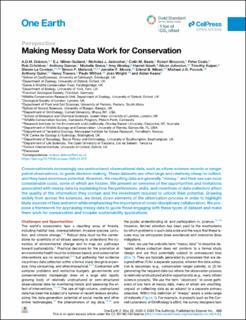Making Messy Data Work for Conservation
Dobson, A.D.M.; Milner-Gulland, E.J.; Aebischer, Nicholas J.; Beale, Colin M.; Brozovic, Robert; Coals, Peter; Critchlow, Rob; Dancer, Anthony; Greve, Michelle; Hinsley, Amy; Ibbett, Harriet; Johnston, Alison; Kuiper, Timothy; Le Comber, Steven; Mahood, Simon P.; Moore, Jennifer F.; Nilsen, Erlend Birkeland; Pocock, Michael J.O.; Quinn, Anthony; Travers, Henry; Wilfred, Paulo; Wright, Joss; Keane, Aidan
Journal article
Published version

Åpne
Permanent lenke
https://hdl.handle.net/11250/2661594Utgivelsesdato
2020Metadata
Vis full innførselSamlinger
- Publikasjoner fra CRIStin - NINA [2364]
- Scientific publications [1392]
Originalversjon
10.1016/j.oneear.2020.04.012Sammendrag
Conservationists increasingly use unstructured observational data, such as citizen science records or ranger patrol observations, to guide decision making. These datasets are often large and relatively cheap to collect, and they have enormous potential. However, the resulting data are generally ‘‘messy,’’ and their use can incur considerable costs, some of which are hidden. We present an overview of the opportunities and limitations associated with messy data by explaining how the preferences, skills, and incentives of data collectors affect the quality of the information they contain and the investment required to unlock their potential. Drawing widely from across the sciences, we break down elements of the observation process in order to highlight likely sources of bias and error while emphasizing the importance of cross-disciplinary collaboration.We propose a framework for appraising messy data to guide those engaging with these types of dataset and make them work for conservation and broader sustainability applications.
